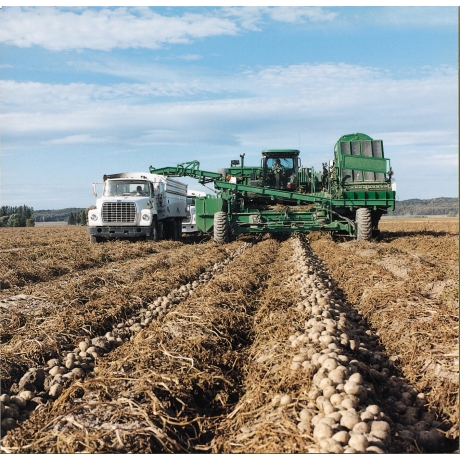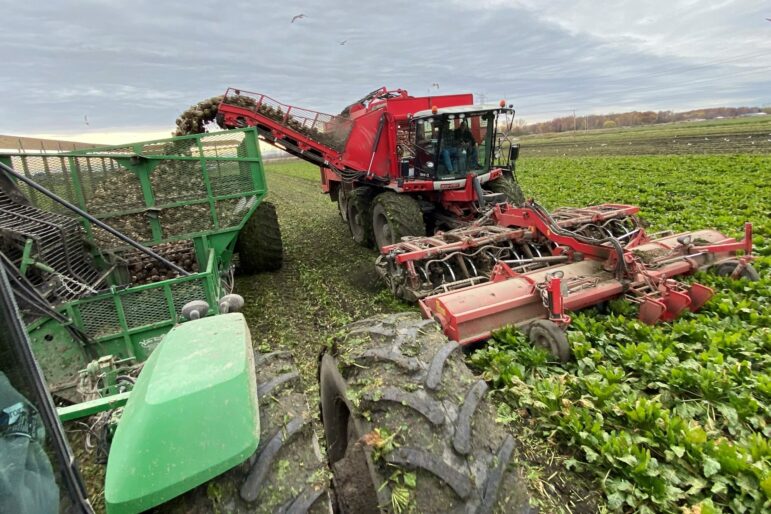
Michigan Potato Industry Commission
Michigan produces the most potatoes for potato chip production in the country.By KENZIE TERPSTRA
Capital News Service
LANSING – While cornfields are abundant throughout the state, Michigan produces many more crops than just corn.
Specialty crops, which are fruits, vegetables, tree nuts, flowers and other horticulture crops, are abundant in the Great Lake state.
“We are the most agriculturally diverse state in the country behind California,” said Theresa Sisung, an industry relations specialist on the public policy and commodity division team at the Michigan Farm Bureau.
Sisung said the state has a strong agricultural market, partly because of its microclimate due to the Great Lakes.
The Great Lakes influence climatic conditions including temperature, wind speed, weather patterns and moisture in localized areas, which affects how certain crops grow in different areas of the state, according to Michigan Sea Grant.
“There are crops that grow really well here because we have the right conditions and natural resources to support agriculture,” Sisung said.
While blueberries, cherries and asparagus are hot commodity crops in the state, others such as sugar beets and potatoes aid Michigan in competing against other states’ agriculture.
Based on data from 2020, Michigan ranked fourth among states that grow the most sugar beets, contributing 12.96% of the nation’s total production.
Sugar beets are most commonly used to manufacture sugar, and they are also processed into beet pulp for livestock feed and molasses.
Last year, Michigan farms yielded 3.97 million tons of sugar beets, according to the National Agricultural Statistics Service.
The agency’s, Oct. 30 crop progress report said this year’s sugar beet harvest is behind the five-year average by 25% due to wet conditions.
The state also ranks high for potato production at No. 8, according to the Michigan Potato Industry Commission.
According to the Michigan Ag Council, potatoes are the state’s second-leading commodity, with Montcalm County as the largest-producing county.
Matt Smego, the director of the public policy and commodity division team at the Michigan Farm Bureau, said the state’s agricultural diversity attracted other production industries, such as potato chip processing.
“We’re the No. 1 chipping potato state in the country,” Smego said.
Michigan potatoes fill one in four bags of potato chips across the U.S., according to the commission.
Smego said the state’s proximity to Canada and the Eastern seaboard of the U.S. provides an advantage for shipping specialty crops out of the state.
“Canada is our biggest trading partner in terms of an export market,” Smego said.
However, many farmers are being challenged by crops imported from foreign countries for local markets.
“Other countries will bring in their products at much cheaper rates, and they’re dumping them into our system right when our growers are starting to harvest or when our peak time frame hits,” Sisung said.
The American Farm Bureau Federation’s Trade Advisory Committee held a recent specialty crop summit in Traverse City, where experts discussed import pressures and how to combat them.
“We talked about programs like ‘Buy America’ and emphasized some ways that we can promote to the consumer that it’s good to buy the products grown here domestically,” Smego said.
Smego said other ways to aid Michigan farmers in competing against imports would be to use a preferential standpoint similar to that of California, which has mandated institutional purchases.
The California mandated purchasing requires correctional institutions to buy 60% of their agricultural goods from in-state farmers as a preference.
“Something like that could help to support farmers and producers in Michigan,” Smego said.
While there currently isn’t any legislation pending for Michigan to follow suit, U.S. Rep. Elissa Slotkin, D-Holly, introduced a bill to increase federal funding for the Specialty Crop Block Grant Program to enhance the competitiveness of specialty crop producers and create new market opportunities for them.
The state was awarded over $2.1 million through the program earlier this year.
The funding is being split among 20 recipients with varying objectives, including the Michigan Department of Agriculture and Rural Development’s international marketing program to increase the domestic and international promotion of the state’s specialty crops.
The state department is seeking public comments on program priorities before the next grant cycle begins on Jan. 4, 2024. Input will be accepted until Nov. 27.

Michigan Sugar Co.
Michigan is No. 4 in the country for sugar beet production.